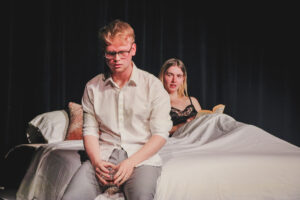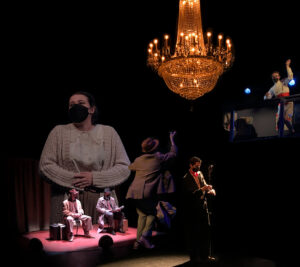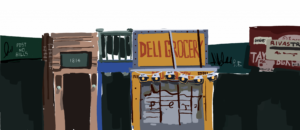By no miracle, but by the determination and talent of a group of scrappy Georgetown students, the Donn B. Murphy One Acts Festival (DBMOAF) has persevered in an environment that has forced the performing arts to adapt. Each year, students submit one-acts to Mask and Bauble Dramatic Society—Georgetown’s longest running theater troupe—and selected submissions are developed into performances in the DBMOAF. Georgetown Theater productions require a commitment that is often demanding, and the amount of time and effort expended by students is always impressive. This year’s performances were no exceptions, as the cast and staff worked tirelessly to adapt their visions and skills to a new stage—Zoom.
The 35th annual festival boasts three student-written works—the first weekend beginning with a staged reading of Catherine Shonack’s (COL ‘22) Under the City Lights followed the next day by a staged reading of Timothy Sutton’s (COL ‘20) Opening Set. The second weekend features Isaac Warren’s (COL ‘20) The Ponderosa, set for March 12-13th. Both acts featured in the first weekend explore the uncertainties and vulnerabilities that their community of focus face every day.
In Under the City Lights, audiences are introduced to fictional city residents facing issues that plague many in real life—eviction, gentrification, immigration, and many more. In an interview following the performance, Shonack cited her experience in an Alternative Breaks Program in Baltimore about racial and economic justice as her inspiration for Under the City Lights. Her work follows characters such as Jacinta and Diego, a couple caught in a vicious cycle of housing instability due to racist pressures from landlords and neglect from the law, and Juliana, a musician struggling to support her family back home in Venezuela while grappling with the knowledge that her future is likely to be more successful in the city away from her family and home.
As the format of this work was a staged reading over Zoom, much of the nuance of the characters’ actions and costumes was lost in this performance. At times, it was difficult to feel engaged with the stories that the characters were telling and the connections between the different monologues were often unclear.
Shonack’s description of her vision and inspiration for the work suggests that the performance given was a fraction of what was intended, through no fault of Shonack, the actors, or the staff. Written before the pandemic when auditoriums could be filled to capacity, she envisioned a very different performance than what was given. She says, “In my mind this play was always supposed to be more interactive, with speakers in the audience, and a lot of the characters are having conversations with the audience, but online that isn’t possible to replicate.” Words can only take us so far, and without the audience’s physical connection to the performers and the lack of visuals, Under the City Lights struggled to come to fruition in a compelling and cohesive way.
However, a positive that Shonack addresses is that streaming the performance online made the production more accessible. She wrote, “Theater has this reputation of being more exclusive and elitist, but the online nature of this play opens it up to be seen by anyone and I feel like that presentation speaks to the themes of the play.” Despite the limitations placed on this performance by COVID-19, Shonack’s creativity and the talent and effort of the staff and cast resulted in a performance worthy of praise.
Opening Set by Timothy Sutton introduces audiences to members of a high school band as they grapple with change and identity, all while practicing and preparing for their opening set. Sutton explained that he wrote the piece never expecting it to be fully produced and performed due to many of the creative liberties within the story. Answering the question of how the staged reading impacted the work, Sutton says, “So I think when you strip all of the visual away, you’re almost able to engage with it in a way that is closer to what it would be like seeing it on a field with all the bells and whistles rather than like, halfway produced in a black box or something, which I think is special!” The emotions of Brad, a timid freshman in the band seeking community and friendship, or Charlie, a senior struggling to find his place in the world outside of high school, are some of many that take center stage in this performance and give color to the strange, exciting, and often uncomfortable and scary transition out of childhood.
The stage directions—read aloud due to the staged reading format—felt like an individual character and elevated the performance by offering detailed descriptions and nuance to the action. According to Sutton, the decision to give life to the stage directions was intentional but not inspired by a virtual setting. Sutton cites Sarah Kane, a British playwright known for pushing boundaries in her work, as inspiration for creating a piece that is not confined to what can or cannot be produced. Not only do the stage directions thwart convention by taking a life of their own, the entire work challenges producers, directors, and actors, asking, “Who can round up seventy five actors to march in a band, who can create a space big enough, who can create a visual as grand as this story?” Opening Set refuses to be confined to a producible narrative and applies beautiful and technical description and dialogue to build out its world in the minds of the audience—perhaps the only place it could be fully formed.
Both Under the City Lights and Opening Set encourage audiences to consider ideas of community and vulnerability. This year’s Donn B. Murphy One Acts Festival is unprecedented. Though everything feels a bit unprecedented these days it is important to acknowledge the talent and the determination of the team that dedicated so much time and effort to these productions. In her director’s statement, Jenni Loo (SFS ‘21) echoes the first weekend’s themes of resiliency, reflecting on the extensive work and commitment to community that Mask and Bauble’s DBMOAF staff and actors gave to these productions. The technical hurdles and the creative innovation from this year’s DBMOAF team are exciting and inspiring, giving hope that there are students in the Georgetown community that will take the helm and continue to create thoughtful and exciting work in trying times.
Disclaimer: Neely is a general member of the Mask & Bauble Dramatic Society, though she took no part in this year’s Donn B. Murphy One Acts Festival production. Sutton, now a graduate, wrote for the Voice during his time at Georgetown.







